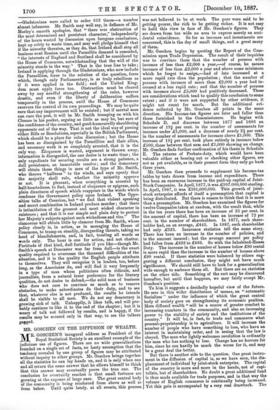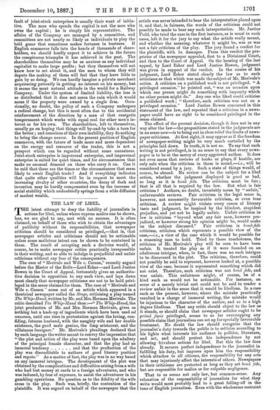MR. GOSCHEN ON THE DIFFUSION OF WEALTH.
MR. GOSCHEN'S inaugural address as President of the Royal Statistical Society is an excellent example of the judicious use of figures. There are no wide generalisations founded on a single set of facts, no hasty assumption that the tendency revealed by one group of figures may be attributed without inquiry to other groups. Mr. Goschen brings together all the statistics he can lay hands on, and it is only when one and all return the same answer that he allows himself to think that this answer may eventually prove the true one. The conclusion he eventually reaches is that small fortunes are growing at the expense of large ones. The great central body of the community is being reinforced from above as well as from below. Until quite lately, at all events, this process
was not believed to be at work. The poor were said to be getting poorer, the rich to be getting richer. It is not easy to hold this view in face of Mr. Goschen's figures. They are drawn from too wide an area to express merely an acci- dental coincidence. So far as incomes and investments are concerned, this is the day of small things, and a great many of them.
Mr. Goschen begins by quoting the Report of the Coin. mission upon Trade Depression. The result of their inquiries
was to convince them that the number of persons with incomes of less than £2,000 a year,—of course, he means incomes of less than £2,000 a year and above some minimum which he forgot to assign,—had of late increased at a more rapid rate than the population ; that the number of persons with incomes of more than £2,000 a year had in- creased at a less rapid rats; and that the number of persons with incomes above £5,000 had positively decreased. These are considerations which tend to qualify this conclusion to some extent ; and if it were not supported by other evidence, it might not count for much. But the additional evi- dence collected by Mr. Goschen all points in the same direction. His Income-tax figures are later and fuller than those furnished to the Commissioners. He begins with Schedule D, and discovers between 1877 and 1886 an increase of 19,1 per cent, in the number of assessments for incomes under £1,000, and a decrease of nearly 21 per cent. in the number of assessments for incomes above £1,000. This increase of 191 per cent, took place entirely in incomes below £500, those between that sum and £1,000 showing no change. Mr. Goschen finds further confirmation of his thesis in Schedule E. The returns of Probate-duty, which would have been valuable either as bearing out or checking other figures, are not as yet available, as in their present form they only go back three years.
Mr. Goschen then proceeds to supplement his Income-tax tables by tests drawn from income and expenditure. There has been an enormous increase in the paid-up capital of Joint- Stock Companies. In April, 1877, it was £507,000,000 sterling. In April, 1887, it was £591,000,000. This growth of joint- stock enterprise affords of itself a presumption that capital is being distributed. But there is reason to think that it is more than a presumption. Mr. Goschen has examined the figures for twelve Companies taken at random, with the result that, while in the ten years there has been an increase of 25 per cent, in the amount of capital, there has been an increase of 72 per cent, in the number of shareholders. In 1877, each share- holder had, on an average, £443. In 1887, each shareholder had only £323. Insurance statistics tell the same story. There has been an increase in the number of policies, and in the amount insured ; bat the average amount per policy had fallen from £492 to £466. So with the Inhabited-House Duty. The increase in the number of houses below £80 rental is more rapid than the increase in the number of houses above £80 rental. If these statistics were balanced by others sug- gesting a different conclusion, they might not have much significance. We should still have to look for a generalisation wide enough to embrace them all. But there are no statistics on the other side. Something of the sort may be discovered hereafter, but until that happens, we may fairly accept Mr. Goschen's position.
To him it suggests a decidedly hopeful view of the future. He sees in this wider distribution of means, an "automatic Socialism" under the influence of which the great central body of society goes on strengthening its economic position. More diffused wealth "will be a source of greater comfort to increasing numbers in the community, and also an increasing power to the stability of society and the institutions of the country." It will be, in fact, to trade and commerce what peasant-proprietorship is to agriculture. It will increase the number of people who have something to lose, who have an interest in maintaining order, and in seeing that the law is obeyed. The man who lightly welcomes revolution is ordinarily the man who has nothing to lose. Change has no horrors for him, since he can hardly be much the worse for it, and may be a great deal the better.
But there is another side to the question. One great instru- ment in the diffusion of capital is, as we have seen, the dis- placement of individual by joint-stock enterprise. The capital of the country is more and more in the hands, not of capi- talists, but of shareholders. No doubt a great additional fund is thus made available for trade purposes, and in that way the volume of English commerce is continually being increased. Yet this gain is accompanied by a very real drawback. The fault of joint-stock enterprises is usually their want of initia- tive. The man who spends the capital is not the man who owns the capital ; he is simply his representative. The affairs of the Company are managed by a committee, and committees are not nearly so likely as individuals to play the bold game that sometimes makes fortunes in business. If English commerce falls into the hands of thousands of share- holders, we should hardly expect it to achieve in the future the conspicuous triumphs it has achieved in the past. The shareholders themselves may be as anxious as any individual capitalist to make large profits ; but they themselves will not know how to set about it, and the men to whom they will depute the making of them will feel that they have little to gain by so doing. We can hardly imagine a private merchant acquiescing patiently in getting no interest on his money, but it seems the most natural attitude in the world for a Railway Company. Under the system of limited liability, the loss is so distributed that it does not mean the ruin which it would mean if the property were owned by a single firm. Occa- sionally, no doubt, the policy of such a Company undergoes a radical change, but this is most often due to the accidental reinforcement of the direction by a man of that energetic temperament which works with equal zeal for other men's in- terest as for his own. The shareholders, left to themselves, usually go on hoping that things will by-and-by take a turn for the better ; and conscious of their own inability, they do nothing to bring the change nearer. In the present position of English commerce, with the future of trade more and more dependent on the energy and resource of the trader, this is not a prospect which can be regarded without some uneasiness. Joint-stock enterprise is impersonal enterprise, and impersonal enterprise is suited for quiet times, and for circumstances that make no unusual demand on those who carry it on. Can it be said that these are the times or the circumstances that seem likely to await English trade ? And if everything indicates that quite other qualities will be in request to meet the increasing rivalry of other countries, the decay of dash and invention may be hardly compensated even by the increase of social stability which undoubtedly springs from a wide diffusion of modest wealth.























































 Previous page
Previous page